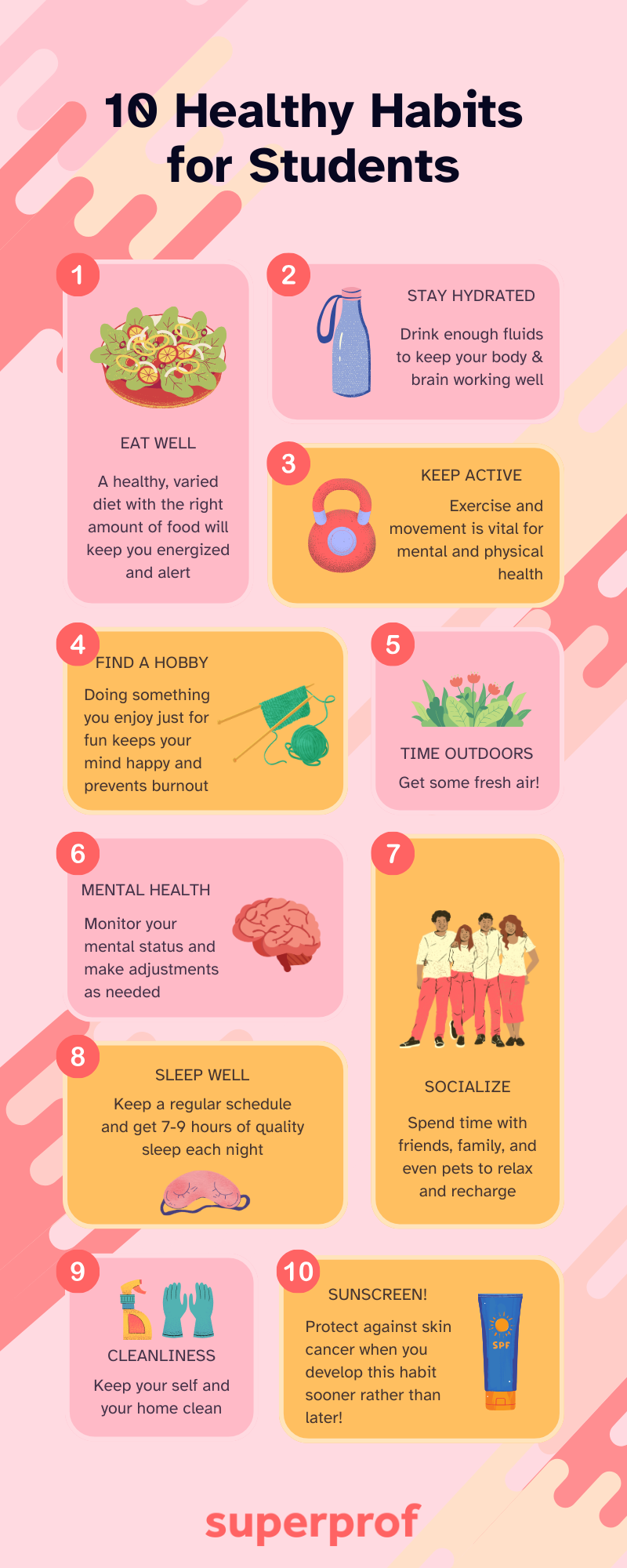Staying healthy as a student is incredibly important, and yet it can be the first thing that gets neglected when you get busy with schooling and your other responsibilities and obligations.
While you’re in university, ensuring to maintain your health with simple habits goes a long way. Better health means better mental health, easier time in class and studying, feeling better and more energized, and avoiding burnout.
Check out these 10 good habits for students to succeed in class and feel great!

10 Most Effective Healthy Habits for Students
It can be tough to learn to balance all your needs once you start university. Before this, you likely had some help at home to prepare your meals and do things around the house.
If you live away from home, you’ll have a lot more responsibility that you might not be used to, and it can be easy to start feeling overwhelmed.
Even if you stay at home during your studies, your life will be different than when you were in Class 11 and Class 12.
Keep these good habits for kids and students in mind to help make sure you do and feel your best during and after university!
1. Eat Well
It’s easy to over or under-eat when you’re a student, and to eat too many high-calorie, high-fat, high-sugar foods and not enough of the nutrients you need.
Juggling studies, work (if you also have a job), and any other responsibilities is a lot; trying to plan a healthy diet and cook well all the time seems impossible.
If you eat at your university, choose the healthiest options they provide for the majority of your meals. If you cook on your own most of the time, try making a list of fast, easy recipes you enjoy so you can meal prep for a few days at a time instead of cooking every day.
Avoid boredom or emotional eating; you can get a low-calorie snack like popcorn, puffed rice, or sunflower seeds in the shell to allow yourself to snack a little healthier when the urge hits.
Also, be sure to eat enough! Many students end up undereating due to stress, being too busy, or social pressures. If you undereat, you will feel more fatigued and emotional, and you’ll get sick more often.
2. Stay Hydrated
Contrary to popular belief, you don’t have to chug 8 glasses of water a day to be adequately hydrated. All liquids (even tea, coffee, and soda) contribute to the amount of liquid in your body. We also get fluids from any non-dry foods we eat!
But, the majority of your daily fluids should come from things like water and fruits to stay properly hydrated. Avoid too much tea, coffee, and sodas; the caffeine and sugar negate some of the hydrating effects of the liquid.
Proper hydration allows your brain to think properly and retain information. It helps you feel awake and alert and keeps your whole body functioning well.
3. Keep Active
You don’t have to become a gym rat to incorporate some movement into your day and keep your body moving!
Take a 15-minute walk, do some gentle yoga or tai chi, dance to your favourite song, or do some easy exercises for 10-30 minutes each day to keep your body and mind fit.
Even a small amount of exercise helps your cardio and respiratory systems get a boost. The blood flow to your brain helps you feel refreshed. Moving your muscles and joints helps you ward off aches and pains and can improve your posture.
4. Find a Hobby
Spend a little time each week on something you like to do just for fun. This might be the same activity you like to do to keep active, but it could be anything! Many people enjoy reading for fun, knitting and crocheting, painting, drawing, colouring, photography, papercraft, visiting museums, or having a mindful cup of coffee at a local cafe.
The key is to have an activity that gets you away from your computer or phone screen for a while since you’re likely already looking at screens for the majority of your days anyway.
So, if gaming is how you relax, make sure to limit your time and do something away from a screen, too.
Spend a little time to yourself regularly to stay happy and healthy!

5. Spend Time Outdoors
For a few minutes each day, be sure to breathe in some fresh air and look at the sky. It might sound silly, but it really makes a big difference in mental health! If possible, try to touch a plant or a domesticated animal for a bonus.
It also helps your physical health when you get moving to go outside and breathe a little deeper.
6. Mental Health Maintenance
Pay attention to the status of your mental health as you go through your university years.
It’s easy to forget to monitor how you’re really feeling as you deal with attending class, working on projects, researching, working, and all the other things mentioned on this list.
If you feel like you’re too overwhelmed and can’t help yourself, seek out a friend, family member, teacher, or professional to help you talk about your feelings. Your university might have counsellors available who can help you sort out things in your mind or life and make it all a little easier.
It’s much better to attend to your mental health when you notice it’s dipping rather than wait until you feel so awful that you don’t have any other choice than to seek out help.
7. Sleep Well
The unfortunate part about university is that you will likely be sleep-deprived at least a few times during your studies due to deadlines and prepping for exams.
During all the other times, however, you can focus on getting good quality sleep to keep your body and mind in peak performance.
Try to stick to roughly the same sleep schedule every day, and don’t oversleep too much on weekends. Avoid using your phone in bed (I know it’s hard, but it’s for the best) so you can fall asleep faster and enter the restorative part of the sleep cycle sooner.
No amount of caffeine and sugar can mimic the effects of high-quality regular sleep.
8. Socialize Regularly
Relax and connect with friends, family, and even animals to boost your spirits. Humans are social creatures, so even if you’re an introvert, you need some human contact once in a while, even if it's only for a short time.
9. Maintain Cleanliness
Another thing that easily gets neglected in university is cleanliness and hygiene. Especially if you’ve never had to worry about it yourself before moving out!
If you’re not sure of how to maintain your dorm or apartment, don’t be afraid to research online; you’re not the only one! Make sure you have the right cleaning products, don’t mix chemicals, and know how to use a washing machine.
As far as personal hygiene goes, you might think there is no way you’ll let that go, but if you’re deep in your studies all the time, it can be easier than you’d think to skip a bath in favour of a nap (and sometimes that’s the right call).
But, when your environment and your body are dirty, it can have a real negative effect on your mental health, leading to a downward spiral. So, be sure to tidy up a little each day and clean at least one part of your body each day.
10. Wear Sunscreen!
An all-too-forgotton-about habit is the simple act of wearing SPF. It might seem unimportant now, but it can save you a lot of hardship and money in the future!
Avoid getting skin cancer like melanoma by wearing at least SPF35 on your face, neck, and tips of your ears every day.

Why Is Health So Important for Students?
It’s important to take an active approach to maintaining your physical and mental health while you’re in university for several reasons.
- You will be a better student when you’re healthy
- Taking care of your health when you’re young helps prevent a lot of diseases and illnesses
- You will feel better about your life when you feel good in your body and mind
- When you graduate, you won’t be feeling burnt out
- Developing healthy habits now is much better than trying to develop them after you start your life in the workforce
Sneaky Ways Students’ Health Declines in University
There are plenty of good habits and bad habits for students to watch out for in university.
These bad habits can feel like a complete non-issue until you look back later and realize how much they affected your life.
Be aware of them while you’re in university to avoid falling prey to their destructive consequences.
Too Much Soda and Sugary Drinks
When I started attending university, my institution gave me access to free, unlimited refills of my all-time favourite soda. Thankfully, I knew that if I let myself drink it every day I would gain a lot of weight, feel awful from all the sugar, and get cavities.
But many people fall victim to this exact scenario because they have all this new-found freedom to make their own choices without their parent’s input.
Adding too many sugary drinks to your diet can pile on the weight and make your brain feel sluggish, but you might not even realize it’s happening!
Set a limit on the amount of sweet drinks (and foods) you consume to maintain health.
The Cheap and Easy Food Trap
Along with sugary drinks, cheap foods are often so enticing it’s hard to say no. Especially when you don’t have a lot of time to cook as a student. However, you must be careful not to overindulge in fatty, greasy, oily, sugary, and carb-heavy foods.
Junk food combined with the rather sedentary life of the average student equals unintended weight gain that can be hard to get rid of later.
Unhealthy food can also contribute to things like cardiovascular issues, heart disease, and even certain cancers.

Caffeine Too Close to Bedtime
Remember how you need to get quality sleep whenever possible? Consuming caffeine less than 6 hours before bedtime can negatively impact the quality of your sleep. Whenever possible, limit your caffeine intake in the evenings and nights.
Also, be aware that you can absolutely overdose on caffeine, and some teens have even died from drinking too much because it causes cardiac arrest. So, make sure you stay below the recommended daily limit of 400 mgs per day.
Eye Fatigue
Technology is a wonderful thing that makes your time in school a lot easier… but it comes with drawbacks.
Protect your eyes from screen fatigue (and from developing a need for glasses, like what happened to me) with a few simple tips.
- Practice the 20-20-20 rule: every 20 minutes, look at something 20 feet away for 20 seconds. This will help reduce eye strain.
- Wear blue light-blocking glasses, especially in the evening, to potentially reduce eye strain
- See an optometrist if your eyes start to hurt; you might need a simple prescription to completely resolve the pain (a +2 prescription in my case)
- Use screens in a well-lit room that isn’t too bright to reduce eye strain
Partying Hard
It’s typical for students to party and stay up late, engage in risky activities, and drink alcohol.
While I’m not suggesting you forego this aspect of university life altogether (unless you want to! Many students have a great time in university without partying), you should party responsibly.
You definitely don’t want to graduate university with an alcohol dependency and a damaged liver! Or worse!
Don’t drink more than you can handle, don’t mix substances, always use protection, and tell your friends where you expect to be.
Not Prioritizing Life Outside of Studies
Some students are so enraptured by their studies that they forget to do anything else.
It’s great to be dedicated, but you also need to live life while you’re in school. Don’t let these years completely pass you by!
If you are only interested in studies, join clubs of like-minded people! You don’t have to participate in activities you have no interest in just to have a social life. You just have to find your people.
University is an amazing, wonderful, stressful, confusing, incredible time for most people. Make the most of it by taking good care of yourself while you learn and get ready for the rest of your life!
Résumer avec l'IA :











